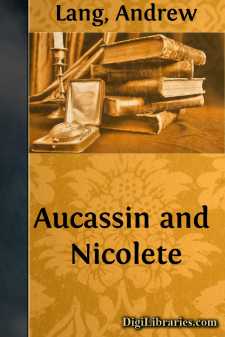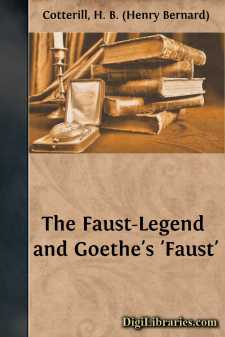Juvenile Fiction
- Action & Adventure 179
- Animals 188
- Biographical 1
- Boys / Men 133
- Classics 1
- Fairy Tales & Folklore 11
- Family 123
- General 262
- Girls & Women 187
- Historical 141
- Holidays & Celebrations 72
- Humorous Stories 2
- Imagination & Play 3
- Legends, Myths, & Fables
- Lifestyles 253
- Mysteries, Espionage, & Detective Stories 12
- Nature & the Natural World 3
- Religious 81
- School & Education 127
- Science Fiction, Fantasy, & Magic 12
- Short Stories 6
- Sports & Recreation 31
- Toys, Dolls, & Puppets 10
- Transportation 44
Legends, Myths, & Fables Books
Sort by:
by:
George Ade
THE FABLE OF HOW UNCLE BREWSTER WAS TOO SHIFTY FOR THE TEMPTER When Uncle Brewster had put on his Annual Collar and combed his Beard and was about to start to the Depot, his Wife, Aunt Mehely, looked at him through her Specs and shook her Head doubtfully. Then she spoke as follows: "You go slow there in the City. You know your Failin's. You're just full of the Old Harry, and when...
more...
by:
Beatrix Potter
The gardener left the hamper by the garden gate, so that the carrier could pick it up when he passed. Timmy Willie crept in through a hole in the wicker-work, and after eating some peas—Timmy Willie fell fast asleep. He awoke in a fright, while the hamper was being lifted into the carrier's cart. Then there was a jolting, and a clattering of horse's feet; other packages were thrown in; for...
more...
by:
Phaedrus
Fable I.THE WOLF AND THE LAMB. Driven by thirst, a Wolf and a Lamb had come to the same stream; the Wolf stood above, and the Lamb at a distance below. Then, the spoiler, prompted by a ravenous maw, alleged a pretext for a quarrel. “Why,” said he, “have you made the water muddy for me while I am drinking?” The Fleece-bearer, trembling, answered: “Prithee, Wolf, how can I do what you complain...
more...
by:
Elinor Glyn
THE DAMSEL AND THE SAGE nd the Damsel said to the Sage: "Now, what is life? And why does the fruit taste bitter in the mouth?" And the Sage answered, as he stepped from his cave: "My child, there was once a man who had two ears like other people. They were naturally necessary for his enjoyment of the day. But one of these ears offended his head. It behaved with stupidity, thinking thereby...
more...
by:
Andrew Lang
INTRODUCTION There is nothing in artistic poetry quite akin to “Aucassin and Nicolete.” By a rare piece of good fortune the one manuscript of the Song-Story has escaped those waves of time, which have wrecked the bark of Menander, and left of Sappho but a few floating fragments. The very form of the tale is peculiar; we have nothing else from the twelfth or thirteenth century in the alternate...
more...
I. ORIGIN AND HISTORY OF THE EFFIGIES OF THE MADONNA. Through all the most beautiful and precious productions of human genius and human skill which the middle ages and the renaissance have bequeathed to us, we trace, more or less developed, more or less apparent, present in shape before us, or suggested through inevitable associations, one prevailing idea: it is that of an impersonation in the feminine...
more...
PREFACE These lectures have been given perhaps half a dozen times, in England, in Switzerland and in Germany. On allowing them to appear in print I should perhaps apologize to my readers for the somewhat free and familiar style in which parts of them are written; but even if I had the time to recast them into a more serious form I should be unwilling to do so, for there is surely enough ponderous...
more...
by:
John Roby
INTRODUCTION TO THE SECOND SERIES. No method has yet been discovered for preserving the recollection of human actions and events precisely as they have occurred, whole and unimpaired, in all their truth and reality. Time is an able teacher of causes and qualities, but he setteth little store by names and persons, or the mould and fashion of their deeds. The pyramids have outlived the very names of...
more...
by:
Beatrice Clay
OF ARTHUR'S BIRTH; AND HOW HE BECAME KING Long years ago, there ruled over Britain a king called Uther Pendragon. A mighty prince was he, and feared by all men; yet, when he sought the love of the fair Igraine of Cornwall, she would have naught to do with him, so that, from grief and disappointment, Uther fell sick, and at last seemed like to die. Now in those days, there lived a famous magician...
more...
by:
Anonymous
TRADITION."What can he tell that treads thy shore?No legend of thine olden time,No theme on which the mind might soarHigh as thine own in days of yore." The Giaour.—BYRON In the beginning of the eighth century Guernsey was a favoured spot. Around, over the Continent and the British Isles, had swept successive conquests with their grim train of sufferings for the conquered; but these...
more...











